Organization of medical examination and medical examination of citizens at. Presentation for the lesson on life safety (grade 11) on the topic: Organization of a medical examination of citizens when they are registered with the military
To use the preview of presentations, create a Google account (account) and sign in: https://accounts.google.com
Slides captions:
Organization of medical examination of citizens when they are registered with the military. Purpose: To acquaint students with the organization of a medical examination of citizens during their initial registration for military registration Teacher of life safety MBOU secondary school No. 9 Kovrov Mochalov Vladimir Vasilievich.
Medical examination of citizens during their initial military registration is designed to ensure the recruitment Armed Forces Russian Federation healthy and practically healthy citizens subject to conscription or entering military service under a contract.
A citizen, upon initial military registration, is subject to a medical examination by specialist doctors: a general practitioner, surgeon, neuropathologist, psychiatrist, ophthalmologist, otolaryngologist, dentist
Categories of fitness for military service are marked with the letters "A", "B", "C", "D", "D": "A" - fit for military service; "B" - fit for military service with minor restrictions; "B" - limited fit for military service; "G" - temporarily unfit for military service; "D" - not fit for military service.
Citizens recognized by a medical examination as fit for military service (category "A") or fit for military service with minor restrictions (category "B") are subject to conscription in the prescribed manner. At the same time, citizens recognized as fit for military service with minor restrictions cannot be sent for military service to the Airborne Forces, marines, in the navy (floating composition) and in individual military specialties.
Citizens recognized as temporarily unfit for military service (category "G") are granted a deferment from conscription for 6 or 12 months for examination (treatment).
Citizens recognized as partially fit for military service (category "B") are enrolled in the reserve of the Armed Forces of the Russian Federation and are subject to periodic once every 3 years) examination until they reach the age of 27, and those recognized as unfit for military service (category " D") are excluded from military registration.
Citizens wishing to enroll in a military educational institution vocational education, undergo a preliminary examination at the military commissariat, and the final one - at a military educational institution.
Conclusions 1) The organization of the medical examination is entrusted to the commission for the registration of citizens for military registration. 2) For each citizen, upon initial admission from medical institutions at the place of residence (training), information characterizing the state of health is provided.
On the topic: methodological developments, presentations and notes
Professional and psychological selection of citizens during the initial registration of citizens for military registration
Lesson-training on life safety in grade 10 to form an idea of the world of professions to acquaint students with goals and types professional psychological selection of citizens during the initial placement on ...
Organization of medical examination
In accordance with the Federal Law "On Military Duty and Military Service", a citizen, upon initial military registration, is subject to a medical examination by specialist doctors: ...
Passage by citizens of medical
examination is an integral part
part of military service
upon initial placement
military registration is aimed at
staffing the RF Armed Forces with healthy and
practically healthy citizens Medical institutions
within 10 days are submitted to the military
commissariats medical documents and
information about the health of citizens
Medical records of outpatients
Medical records of inpatients
radiographs
Protocols special methods research Citizen is subject to
medical examination
medical specialists
therapist
surgeon
neuropathologist
ophthalmologist
otolaryngologist
psychiatrist
doctors of other specialties Categories of fitness for military service
"A" - fit for military service
"B" - fit for military service with
minor restrictions
"B" - limited fit for military
service
"G" - temporarily unfit for military
service
"D" - not fit for military service Citizens deemed fit for military
service (category "A" or fit for
military service with minor
restrictions (category "B") are subject to
military conscription in
in due course Citizens declared fit for military service
minor restrictions (category "B"), cannot
be sent for military service
in the airborne troops, marines,
to the Navy (floating structure)
and for individual military specialties Citizens recognized as temporarily unfit for military
service (category "G"), a deferment from
call for 6 or 12 months for examination (treatment) Citizens recognized as partially fit for military
service (category "B"), are credited to the reserve of the Armed Forces of the Russian Federation and
subject to periodic (once every three years)
certification before they reach
27 years of age active
tuberculosis
mental
disorders
epilepsy
chronic
bronchitis
skin
diseases
(psoriasis,
eczema)
disease
endocrine
bodies
Citizens
recognized
unfit for military
service
(category "D") -
excluded from
military registration
peptic ulcer
duodenal
guts
sugar
diabetes
chronic
alcoholism
substance abuse
addiction
ulcerative
disease
stomach
hypertonic
disease All citizens subject to
initial military enlistment
registration and conscription for military service,
pass medical examination
Fluorographic (X-ray)
organ research chest
Blood test (determination of ESR, hemoglobin,
leukocytes
Urinalysis (specific gravity, protein)
On the day of the examination - measurement of height and
body weight The ratio of height and body weight
in persons aged 18-25 years
* Hypotrophy is one of the forms chronic disorder food, at
which reduces body weight and gradually develops exhaustion Citizens wishing to enroll in military training
institution, undergo preliminary
examination at the military commissariat, and
final - in a military educational institution
For preliminary examination are sent
citizens who have:
a) normal color perception;
b) visual acuity of at least 1.0 in each eye without
corrections;
c) blood pressure is not higher than 130/50 and not lower
105/50 mmHg Art. Commission for military registration, except
organization of medical
examinations to determine their suitability for
military service for health reasons, conducts
activities for professional psychological
selection of citizens to determine their suitability for
training in military specialties
Psychological and psychophysiological examination
carried out using a universal set of
seven psychodiagnostic tests
In accordance with the Federal Law "On Military Duty and Military Service", a citizen is subject to a medical examination upon initial military registration. specialist doctors: therapist, surgeon, neuropathologist, psychiatrist, ophthalmologist, otolaryngologist, dentist, and, if necessary, doctors of other specialties. Medical examination of citizens during their initial military registration is aimed at staffing the Armed Forces of the Russian Federation with healthy or practically healthy citizens who are subject to conscription or entering military service under a contract.
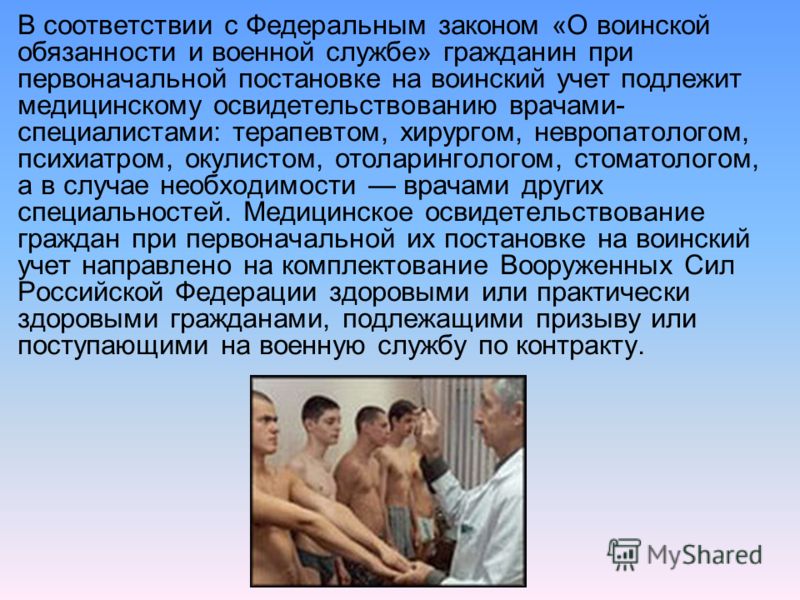
Significant growth in social dangerous diseases. The incidence of tuberculosis has increased by almost 2 times, syphilis by 49 times. Drug addiction increased 6.5 times compared to 1990, alcoholic psychosis 4.2 times. From 33 to 44 million cases of infectious diseases are registered annually in Russia. The threat of outbreaks remains especially dangerous infections(plague, cholera, anthrax). At present, the procedure for organizing and conducting a military medical examination, as well as the requirements for the level of health of citizens performing military duty, are determined by the Regulations on military medical examination, approved by Decree of the Government of the Russian Federation dated g, 390. Requirements for the state of health of citizens entering for military service, developed by medical specialists of the Ministry of Defense of the Russian Federation together with medical specialists of the Ministry of Health of the Russian Federation, which provides a more reliable approach to assessing the health status of those entering military service.
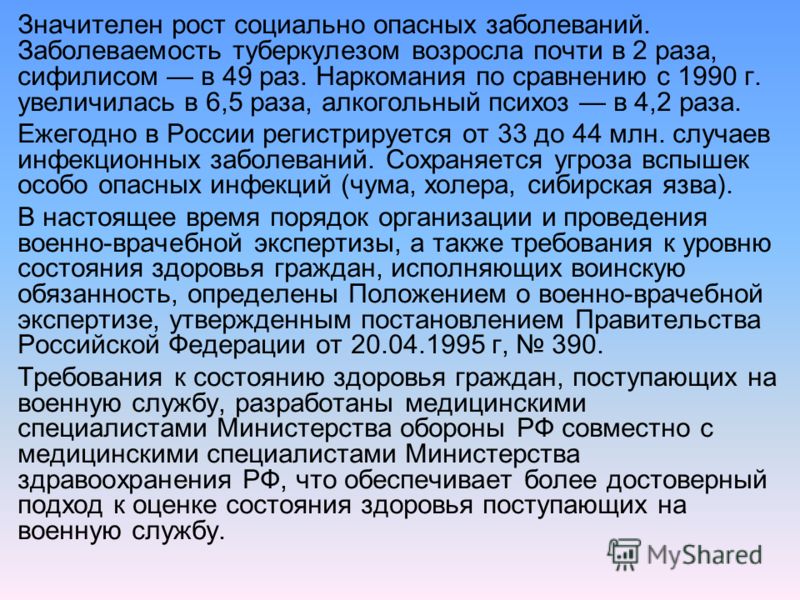
Established requirements for the state of health of citizens, according to medical professionals The Ministry of Defense of the Russian Federation are optimal and ensure, from the point of view of medical selection, the performance of tasks by military personnel both in peacetime and in combat situations. The organization of the medical examination is entrusted to the commission for the registration of citizens for military registration. In order to correct assessment the state of health of citizens and determining the category of their suitability for military service, before the start of a medical examination, military commissariats for all citizens subject to initial military registration request information from medical institutions at the place of residence (training) characterizing the state of health. If required, the necessary laboratory and other studies are carried out.

At the same time, the examination and treatment of a citizen entering military service, in accordance with the Law of the Russian Federation "On Medical Insurance of Citizens in the Russian Federation", is carried out by a medical institution free of charge. A specialist doctor, having studied the submitted medical documents for a citizen and examined him, assesses the state of health, physical development and makes a conclusion on the category of fitness for military service. The categories of fitness for military service are indicated by the letters "A", "B", "C", "D", "D": "A" is fit for military service; "B" is fit for military service with minor restrictions; "B" limited fit for military service; "G" is temporarily unfit for military service; "D" is not fit for military service.
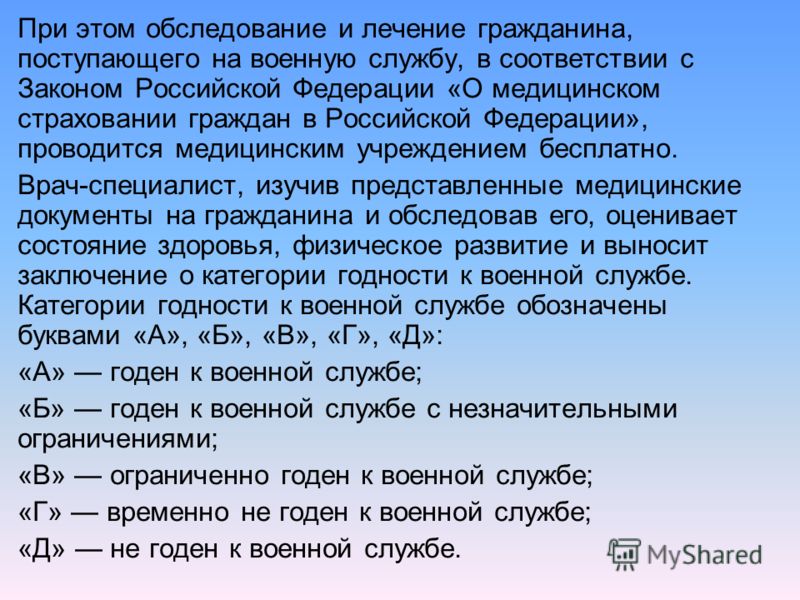
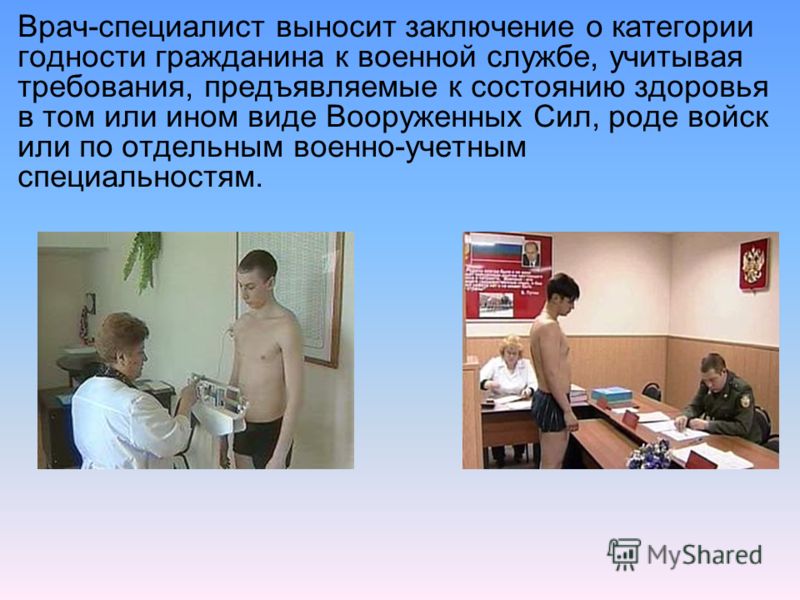
The indicated categories of fitness for military service are the same for all citizens performing military duty. At the same time, it is considered that the definitions “fit for military service” and “fit for military service with minor restrictions” do not imply the absence of a citizen of any disease or defect physical development. He may have certain diseases, which do not significantly affect the functions of the organs and systems of the body and allow him to perform the duties of military service without harm to health.

Citizens who are recognized by a medical examination as fit for military service (category "A") or fit for military service with minor restrictions (category "B") are subject to conscription for military service in accordance with the established procedure. At the same time, citizens recognized as fit for military service with minor restrictions cannot be sent for military service to the airborne troops, marines, the Navy (floating personnel) and certain military registration specialties. Citizens recognized as temporarily unfit for military service (category "G") are granted a deferment from conscription for 6 or 12 months for examination (treatment).

Citizens recognized as partially fit for military service (category "B") are enrolled in the reserve of the Armed Forces of the Russian Federation and are subject to periodic (once every 3 years) examination until they reach the age of 27, and those recognized as unfit for military service (category "D ”) are excluded from military registration. Determining the category of fitness for military service is the main task of the military medical examination. A conclusion on the category of fitness for military service is always made based on the results of an assessment of the state of health of the person being examined at the time of the examination only if the outcome of the existing illness (injury) has been determined and the category of fitness can be determined. In the event that the outcome of the disease is not determined, and in order to restore the citizen's ability to perform duties military service time is required, a conclusion is drawn up temporarily unfit for military service (category "G").

In the course of many years of practice military medical expertise during the initial registration of citizens for military registration accumulated great experience approaches to determining the category of a citizen's fitness for military service. For reference, here are a few examples: When determining the category of fitness for military service of citizens who have undergone acute infectious diseases the state at the time of the examination is taken into account: if a person has fully recovered, he is recognized as fit for military service.

However, citizens who have had viral hepatitis (an infectious disease characterized by liver damage), typhoid fever(infectious disease from the group intestinal infections) and paratyphoid (intestinal infectious diseases), after the end of inpatient treatment, they are recognized as temporarily unfit for military service (category "G") and they are given a deferment from conscription for 6 months in order to determine, upon re-examination, whether the course of these diseases has passed into chronic course. Citizens are not subject to conscription for military service: with active tuberculosis; clinically cured of pulmonary tuberculosis with large residual changes in the lungs, as well as cured of pulmonary tuberculosis before being removed from the dispensary. Citizens suffering from diseases are not subject to conscription for military service endocrine organs, diabetes. Citizens with mental disorders, including mental retardation, are not subject to conscription for military service mild degree, chronic alcoholism, drug addiction and substance abuse, as well as epileptic symptoms.

Citizens subject to conscription for military service, if they have persistent cardiac arrhythmias or general circulatory failure due to diseases of cardio-vascular system are recognized as limited fit for military service (category "B"), Citizens suffering from hypertension(disease characterized by increased blood pressure). Citizens who have Chronical bronchitis. Citizens suffering from peptic ulcer stomach and peptic ulcer duodenum. In peacetime, citizens suffering from such skin diseases like psoriasis, eczema, diffuse neurodermatitis, discoid lupus erythematosus, photodermatitis.

The right to issue conclusions on diseases, the presence of which entails exemption from military service or a deferment from it, is granted to specialist doctors involved in the examination of citizens during their initial military registration and conscription. Citizens recognized at the initial military registration as in need of examination (treatment) are recorded by the military commissariat and sent to medical institutions where a medical examination (treatment) will be carried out. A referral for examination is issued to a citizen when the decision of the commission on military registration is announced.
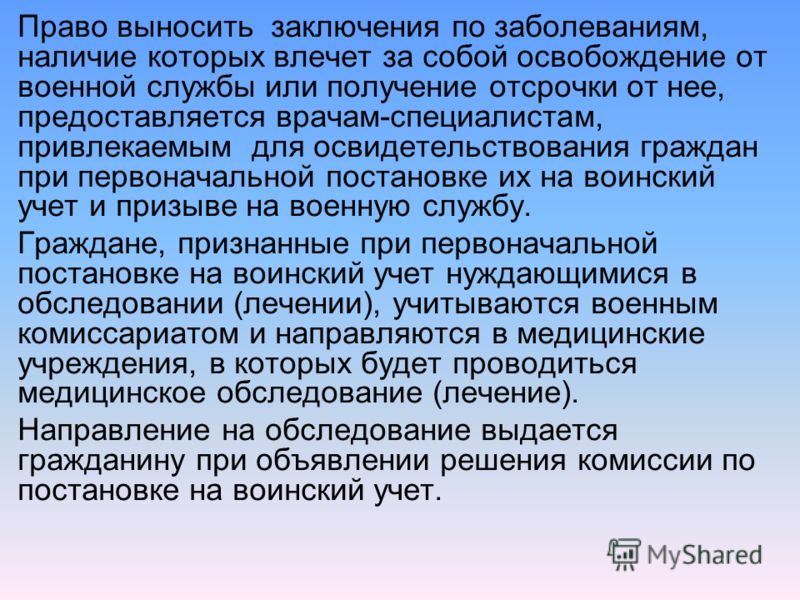
The name is indicated in the direction medical institution, diagnosis, purpose of the examination and the period of re-appearance for examination. Control over the timeliness of examination (treatment) and re-examination is carried out by the military commissariat. All citizens subject to initial registration for military registration, before a medical examination, but not earlier than 30 days in advance, undergo a fluorographic examination of the chest organs, a urine test, a blood test, and on the day of the examination, a measurement of height and body weight.
![]()
Height, cm Body weight, kg Hypotrophy Reduced nutrition Normal nutrition Increased nutrition Obesity I degree Obesity II degree 15041.6 41.7- 43.7 43.8-51.751.8-61.761.8-67.467.5-78.4 44.5- 46.7 46.8-55.155.2- 65.966.0-71.972.0-83.3 47.4-49.8 49.9-58.858.9-70.370.4-76.776.8-89.3 50.4-52.9 53.0-62.562, 6-74.774.8-81.581.6-95.4 53.5-56.2 56.3-66.466.5-79.479.5-86.6 86.7-101.6 56.7-59.6 59 ,7-70.370.4-84.184.2-91.7 91.8-107.9 60.0-63.1 63.2-74.474.5-89.089.1-97.1 97.2-113.3 The ratio of height and body weight in persons aged 18 - 25 years

information about research results and preventive vaccinations and intolerance medications recorded in the citizen's account. Citizens wishing to enter a military educational institution conduct a preliminary examination at the military commissariat, and the final examination at a military educational institution. The commission for the registration of citizens for military registration, in addition to organizing a medical examination to determine their fitness for military service for health reasons, takes measures for the professional psychological selection of citizens to determine their suitability for training in military specialties.

In the Armed Forces of the Russian Federation, professional psychological selection is a set of measures aimed at the implementation of high-quality recruitment of military positions on the basis of ensuring that professionally important individual psychological qualities and abilities of citizens entering military service meet the requirements of military professional activity. In the military commissariats, professional psychological selection is carried out by a non-regular group of professional selection. In the process of initial registration of citizens for military registration, the professional selection group, according to the data socio-psychological study and the results of a psychological and psychophysiological examination determines, taking into account four categories, professional suitability for training in military educational institutions or training citizens in military specialties in state and public organizations.
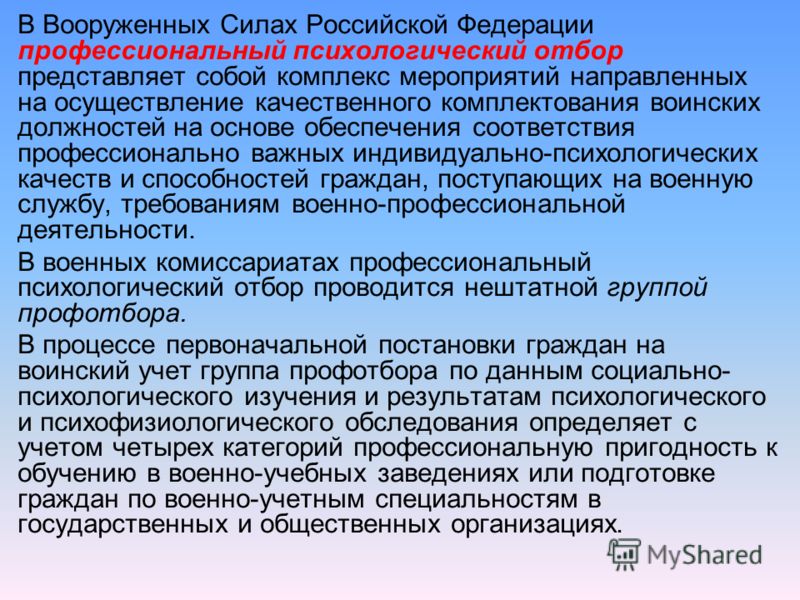
Psychological and psychophysiological examination is carried out using a universal set of seven psychodiagnostic tests. Conclusions on the professional suitability of citizens are reported to the commission for the registration of citizens for military registration to determine their possible use in military service. In the period from the initial registration of citizens for military registration until they are called to the draft board, the professional selection group organizes events for the military professional orientation of recruits; conducts a preliminary selection of candidates for admission to military educational institutions; selects candidates for training in military specialties of soldiers, sailors, sergeants and foremen.

By the time a citizen is called to the draft board, the professional selection group, taking into account all the information about his individual psychological qualities and abilities, general educational and professional suitability for military service, taking into account the requirements for execution military duties seven classes of similar military positions (command, operator, communications and surveillance, driver, special purpose, technical, etc.), replaced by sergeants, foremen, soldiers and sailors, forms a proposal for the draft commission on the assignment of citizens to one or another type, branch of the Armed Forces or other troops
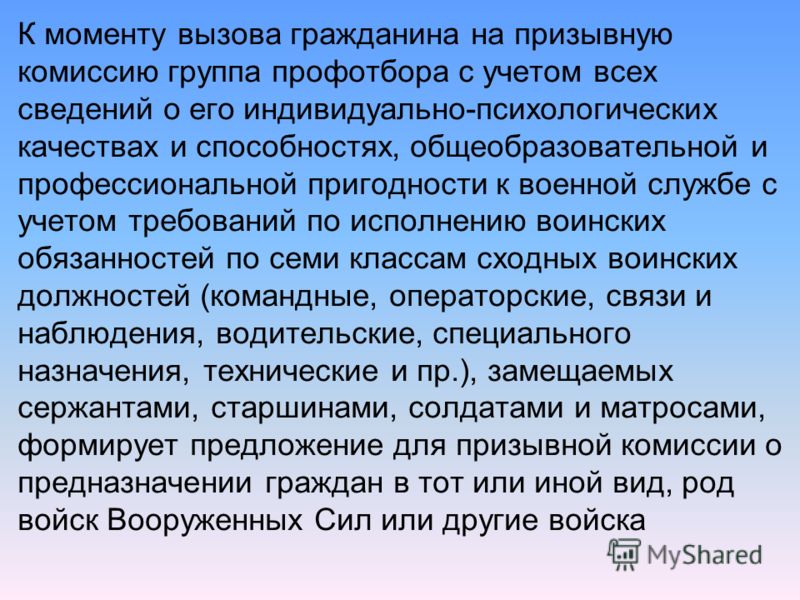
surveys
The methodological recommendations have been prepared in accordance with the Instruction on the procedure for conducting a military medical examination and medical examination in the internal affairs bodies of the Russian Federation and internal troops Ministry of Internal Affairs of the Russian Federation, approved by order of the Ministry of Internal Affairs of the Russian Federation of July 14, 2010 No. 523, as well as in accordance with the order of the Ministry of Internal Affairs of Russia of May 19, 2009 No. 386 "On the procedure for selecting citizens for service (work) in the internal affairs bodies of the Russian Federation", paragraph 2 of the Action Plan for improving work with the personnel of the internal affairs bodies of the Russian Federation, approved by order of the Ministry of Internal Affairs of Russia dated April 30, 2009 No. 341.
Examination of citizens entering the service
List of documents submitted to the VVK:
The direction for medical examination of the IHC of citizens entering the service is carried out by the head (head) of the internal affairs body, who has the right to appoint to a position and dismissal, or the head of the personnel apparatus of the internal affairs body with reference to the decision of the corresponding head (head) of the internal affairs body.
The period of validity of the referral for examination is three months.
Before issuing a referral for a medical examination (Appendix No. 1) to citizens entering the service in the internal affairs bodies, the heads of the component bodies study military cards, temporary certificates issued in exchange for a military card, identity cards of a serviceman of the Russian Federation. The information obtained as a result of the study in the part related to the conduct of a military medical examination is reflected in paragraphs 3, 4 of the referral for a medical examination.
In the referral for a medical examination, the purpose of the examination (a matter to be considered by the IHC) must be clearly indicated.
In the directions entering the service of citizens from among those dismissed from the internal affairs bodies and other bodies, from the troops of the Ministry of Defense of the Russian Federation, other troops, military formations, the date and reason for dismissal must be indicated. In the directions entering the service of citizens, the position and the group of assignment corresponding to it are indicated.
If the referral does not contain the data necessary to resolve the expert issue, the IHC, in accordance with the current regulatory documents, returns it to the sending official to clarify the missing information.
2. Passport.
3. Military ID or registration certificate.
4. Information about being registered (observed) regarding:
Mental disorders, drug addiction, alcoholism, substance abuse, abuse drugs and other toxic substances, tuberculosis, skin-venereal and other chronic diseases indicating the diagnosis, date of registration and follow-up (certificates from the psycho-neurological, narcological, dermatovenerological, anti-tuberculosis dispensary) from the place of residence. If the place of residence has changed, then certificates are submitted from each place of residence for the last 5 years.
5. Medical outpatient card of a medical institution at the place of residence, a medical book of a military man for citizens who served under a contract.
7. Fluorographic (X-ray) examination of the chest in two projections for the last six months.
9. Clinical Analysis blood (expanded).
10. General analysis urine with indication of specific gravity.
11. Blood test for HIV, syphilis, markers viral hepatitis B and C (survey results on separate forms, certified by the seal of the institution).
12. Study of blood glucose levels (after 40 years).
13. Function research vestibular apparatus entering the service by types of activity related to groups 1 and 2 of destination, as well as to the courier service.
14. Additionally, to the list for former police officers entering the service, the following is provided: an extract from the order of dismissal (indicating the reason for dismissal), service record.
The examination results are valid for 3 months.
If a candidate for service has previously served (military service) and was dismissed for health reasons, the leadership of the internal affairs bodies in without fail a copy of the certificate of illness is requested and submitted to the VVK.
In case of repeated (before the expiration of three months from the date of issuance of the conclusion of the IHC) the direction of citizens entering the service, before a medical examination, they are repeated: a clinical blood test, a general urinalysis, a blood test for syphilis, an ECG, is issued new act medical examination. If these citizens are sent for examination after three months, the examination is carried out in full.
^ Examination of citizens entering the study in educational institutions Ministry of Internal Affairs of the Russian Federation
Preliminary examination is carried out no earlier than 6 months before the entrance exams.
The list of documents submitted to the VVK by citizens entering the educational institutions of the Ministry of Internal Affairs of the Russian Federation:
All documents specified in the previous list for citizens entering the service are provided.
In the directions received by educational institutions, the full name of the educational institution, faculty and the destination group corresponding to the profile of the faculty are indicated.
Additionally, radiographs are provided. paranasal sinuses nose with description, 1 photo 3x4 or 5x6 cm.
In addition, for applicants to secondary schools and police colleges, it is necessary to provide the results of sowing from the nose and throat for diphtheria, stool examination for helminth eggs and the dysentery group.
^ Examination of employees of internal affairs bodies
When sending employees for a medical examination of the VVK in connection with the relocation, extension of service life, dismissal, the following documents are submitted:
The direction indicates the special rank of the employee, position, group of destination. In addition, when moving through the service, the position to which the promotion is planned must be indicated. Upon dismissal, the reason for dismissal and length of service are additionally indicated.
2. Service certificate.
In the absence of an official certificate, a certificate from the personnel department with a photograph indicating the special rank, position, terms of service in the internal affairs bodies is provided.
3. Medical record of an outpatient.
4. Medical characteristics (detailed extract) from medical card outpatient.
AT medical record(extract) must contain information about the results of the dynamic dispensary observation for the state of health of the employee, his appeal for medical care and the number of days of temporary disability for the last 2 years, the impact of job duties on health, as well as the final diagnosis.
5. Fluorographic (X-ray) examination of the chest organs in two projections (if in medical documents no information about this study within the last 6 months).
6. Clinical blood test.
7. General analysis of urine.
8. Electrocardiographic study at rest and after exercise (ECG film and doctor's report).
9. Help from a psychiatrist.
10. Help from a narcologist.
An internal affairs officer over the age of 40 is measured intraocular pressure, blood glucose test. By medical indications other additional studies may be carried out.
If an internal affairs officer refuses to be examined, as well as if he does not appear at the VVK for examination for more than 3 months from the start of the commission, the examination procedure is terminated.
Control over compliance by an internal affairs officer with the terms of examination is assigned to the personnel unit of the internal affairs body that sent the employee for examination (issued a referral to the IHC).
For diseases for which the Schedule of Diseases provides for an individual assessment of fitness, the conclusion of the VVK is issued taking into account the nature of the disease or physical disability, the severity functional disorders, as well as the education, specialty and actual performance of the person being examined and the requirements imposed by the service on the state of health.
The list of documents submitted to the VVK by police officers entering the educational institutions of the Ministry of Internal Affairs of Russia for full-time education:
The direction must indicate the special rank, position of the employee, full name educational institution, faculty, purpose group and form of education.
2. Service certificate.
3. Outpatient card.
4. Extract from outpatient card from a therapist.
5. Electrocardiographic study at rest and after
Loads (ECG film and doctor's report).
6. Fluorographic (X-ray) examination of the chest in two projections for the last six months.
7. Radiographs of the paranasal sinuses with a description.
8. Clinical blood test.
9. General analysis of urine with indication of specific gravity.
10. Blood test for HIV, syphilis, markers of viral hepatitis B and C (survey results on separate forms).
11. Help from a psychiatrist.
12. Help from a narcologist.
13. Photo 1 pc. size 3x4 or 5x6 cm in shape.
The list of documents submitted to the VVK by police officers entering the educational institutions of the Ministry of Internal Affairs of Russia for in absentia learning:
The direction must indicate the special rank of the employee, the full name of the educational institution, faculty and form of study.
2. Service certificate.
In the absence of a certificate, a certificate from the personnel unit with a photograph indicating the special rank, position, terms of service in the internal affairs bodies is submitted.
3. Outpatient card.
4. Extract from the outpatient card.
5. Fluorographic (X-ray) examination of the chest in two projections for the last six months.
6. Electrocardiographic study at rest and after exercise (ECG film and doctor's report).
7. Clinical blood test.
8. General analysis of urine with indication of specific gravity.
9. An extract from a psychiatrist.
10. Extract from a narcologist.
All certificates and extracts are certified by the personal seal of the doctor and the seal of the medical institution.
When sending employees for examination by the military and military commission to determine the severity of the injury (injury) received during the period of service, the following documents are submitted:
2. Service certificate.
3. Certificate of injury.
4. Conclusion of an internal audit on the circumstances of the injury (injury) by an employee.
The official documents should reflect the circumstances of the injury in the wording:
Injury received while on duty
The injury was received as a result of an accident not related to the performance of official duties.
5. A document (certificate of incapacity for work) confirming the fact of the employee's release from official duties due to temporary incapacity for work.
6. Medical documents confirming the fact of the appeal
Employee for medical care, outpatient (inpatient) treatment:
Medical record of an outpatient (inpatient) patient;
Detailed discharge epicrisis from the outpatient card on treatment due to injury;
results instrumental methods researches (roentgenograms with the description, protocols of instrumental researches).
Medical documents must be certified by the personal seal of the doctor and the seal of the medical institution.
If, based on the results of the examination, it is established that the injury received is not included in the List approved by Decree of the Government of the Russian Federation dated July 29, 1998 No. No. 855, a certificate of the severity of the injury is not issued.
Scroll required documents for determining causation diseases, injuries that led to the death (death) of an employee:
1. The direction of the personnel department indicating the special rank, position, last place of service of the employee.
2. Information about the service in the Department of Internal Affairs (help-objective).
If the employee served in the states where they were fighting(indicating the calculation of length of service 1:3), performed work on the liquidation of the Chernobyl accident, participated in the performance of tasks in conditions state of emergency in armed conflicts, an extract from the order with relevant information is attached.
3. A certified copy of the death certificate.
4. A certified copy of the death certificate.
5. The act of pathoanatomical research. If pathological
Anatomical examination was not performed, a document indicating the reason is presented.
In the event that the protocol indicates the presence of alcohol in the blood or urine of the deceased (deceased), the conclusion of the forensic medical bureau on a possible causal relationship of death with alcohol intoxication is additionally submitted.
6. Extract from the order of the Department of Internal Affairs on exclusion from the lists of personnel.
7. Conclusion of an internal audit on the fact and circumstances
During the period of service, injuries (wounds, injuries, contusions), diseases that led to death.
8. Outpatient card.
9. Detailed extract from the outpatient card.
If the employee was on inpatient treatment in medical institutions, discharge epicrises (certified photocopies) are submitted indicating the diagnosis, the results of the examination, the treatment performed.
The list of required documents for determining the category of fitness for service and establishing the causal relationship of diseases at the time of dismissal from service in the Department of Internal Affairs:
The purpose of the referral is to determine the category of fitness for service at the time of dismissal from the Department of Internal Affairs, indicating the date and reason for dismissal;
Retired ranks, former position (group of assignment), place of service, time of service in the Department of Internal Affairs, length of service, data from the previous examination of the VVK;
Reflect the reason why the medical examination at the VVK, in connection with the dismissal from the service from the Department of Internal Affairs, was not carried out;
Specify the referral number, date of issue, position, rank, surname and signature of the referral person.
The direction must be certified by the seal of the ATS unit.
2. Extract from the order of dismissal from service in the Department of Internal Affairs.
3. Help-lens.
4. All available medical documents characterizing
Health status former employee for the period of service in the Department of Internal Affairs.
5. Service record from the last duty station in the Department of Internal Affairs.
6. For a citizen dismissed from service for health reasons due to mental disorder, the conclusion of a specialized medical institution is submitted.
Submitted copies of extracts from medical records must be duly certified.
The conclusion of the IHC at the time of dismissal from the service from the Department of Internal Affairs is issued only according to the data available in the medical documents for the period up to the date of dismissal.
13. Examination of citizens is carried out at the place of residence or the place of their attachment to a medical institution in the direction of the relevant medical institution (medical advisory rehabilitation commission).
14. Commissions conduct examinations of citizens, including children under 16 years of age, in cases where the law connects the granting of rights to social assistance or exemption from the performance of relevant duties to the establishment of disability, and in other cases provided for by current legislation.
15. The direction of citizens for medical and social examination is carried out after carrying out diagnostic, therapeutic and rehabilitation measures. Persons who are sent to the commission during a period of temporary incapacity for work undergo an examination out of turn at all stages of the examination.
16. Commissions hold field meetings in medical institutions.
17. When a patient cannot appear at the commission for health reasons according to the conclusion of the medical institution, the examination is carried out at home or in the hospital where he is being treated: if it is impossible to organize an offsite meeting of the commission, an expert decision in exceptional cases may be taken in absentia.
For persons who are on long-term inpatient treatment outside the Republic of Belarus, an expert decision may be made by the regional, Minsk central city and republican commissions in absentia upon submission of documents from a medical institution.
18. Commissions meet in in full force and make a decision after a collegial discussion of the results of the survey. The data of the expert examination and the decision of the commission are recorded in the minutes of the meeting and the act of examination of the commission, which are signed by the chairman, other members of the commission and certified with a seal.
When the chairman or some members of the commission do not agree with decision, their dissenting opinion is entered into the certificate of examination and the act is submitted within 3 days to the regional, Minsk central city commissions, which make a decision on this issue.
The decision of the regional and Minsk Central City Commissions (including during examination in difficult cases, by way of control or appeal and in other cases) are adopted by a majority vote of the members of the commissions. In case of equality of votes, the vote of the chairman of the commission is decisive. A member of the commission who does not agree with the decision made, expresses his dissenting opinion in writing, which is attached to the case.
19. The date of establishment of disability is the day the commission receives the documents necessary for the examination of the patient.
20. Certificates with a decision on the group, causes of disability, the period for re-examination of the commission are sent to the pension authorities (the social security department of the executive committee of the Council of People's Deputies, the regional military enlistment office, the internal affairs department of the regional executive committee, the state security department of the regional executive committee) and at the place of work. An individual rehabilitation program is issued by a commission to a disabled person.
The form of documents used in the work of the commissions is approved by the Ministry of Health in agreement with the relevant ministries and departments.
21. Persons guilty of making an unintentionally wrong decision, illegal issuance of commission documents, bear responsibility under the current legislation.





